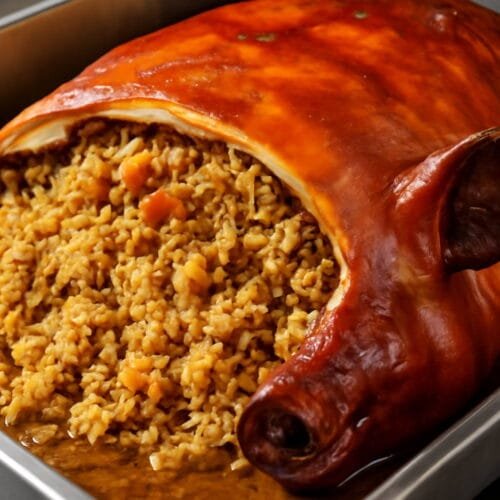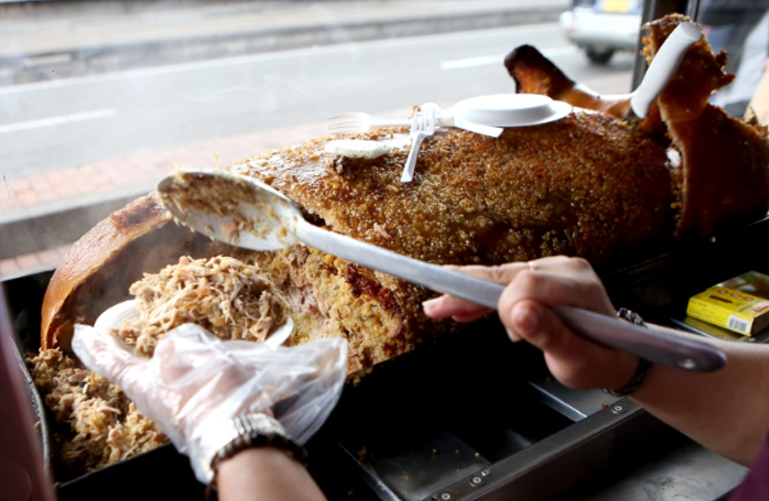Colombian lechona is a traditional dish featuring a crispy, golden-brown skin filled with a flavorful stuffing of rice, pork, bacon, peas, raisins, and olives. Each bite offers a perfect blend of textures and flavors. This dish is a classic of Colombian cuisine and is often served at festive gatherings and special celebrations.
Maybe you might like: Fried rice with vegetables

Colombian Lechona: Traditional Step-by-Step Recipe
Ingredients
The ingredients may vary depending on the region and the size of the lechona, but the basics are:
- 1 small piglet 8 a 10 kg.
- 3 cups of cooked rice
- 2 kg of pork meat chopped into small pieces
- 1 cup of cooked peas optional, Huila version
- onion garlic, cumin, and salt to taste
- Color or annatto to add color and flavor
Step-by-Step Preparation
Step 1: Cleaning the pig
- Wash the skin of the lechona thoroughly with water and salt to remove any impurities
- Gently scrape with a knife to make it very clean
- Dry it with a clean cloth and set it aside
Step 2: Prepare the marinade
- In a large bowl, mix crushed garlic, chopped green onion, cumin, salt, pepper, and annatto (achiote)
- Add a little lard or oil
- Spread this mixture all over the inner skin of the pig and also over the meat you will use for the filling
- Let it marinate for at least 2 hours (ideally overnight in the refrigerator)
Step 3: Prepare the filling
- Cook the rice until medium done (not completely soft, as it will continue cooking in the oven)
- Sauté the pork meat cut into small pieces with some of the reserved marinade
- Incorporate the rice, the cooked peas (if it's the Huila version), and adjust the salt
- Mix well until you get a uniform and tasty filling
Step 4: Stuff the lechona
- Place the pork skin spread out on a large table
- Add the filling little by little, distributing it evenly
- Sew the opening with a thick needle and strong kitchen thread, making sure it is well sealed so the filling does not come out during cooking
Step 5: Slow baking
- Preheat the oven to 180°C.
- Place the lechona on a large tray
- Cover with aluminum foil and bake for 4 to 5 hours
- Remove the foil and continue baking for 1 to 2 more hours so that the skin becomes golden and crispy
- During baking, occasionally baste with pork lard to enhance the golden color
Step 6: Serve the lechona
- Once ready, let it rest for 20 minutes before cutting
- Serve generous portions accompanied by white or yellow arepa, papa chorriada, and spicy ají
Vidéo
Notes
- Traditional Huila lechona includes green peas, while Tolima lechona does not. Both are equally tasty but have different textures
- If you don’t have a large oven, you can make a smaller version using only the pork leg stuffed with rice and spices. It bakes in 2–3 hours
- A lechona weighing 8 to 10 kilos serves approximately 12 generous portions. For large groups, it is recommended to calculate about 250–300 grams per person.
- To get the skin nicely golden, remove the foil during the last hour of cooking and brush with pork lard.
- Colombian lechona is traditionally served with white or yellow arepas, “papa chorriada” (potatoes in a creamy sauce), and a good spicy ají.
- If there are leftovers of lechona, you can store it in the fridge for up to 3 days. To reheat, it’s best to use a low-temperature oven so it stays crispy.
Nutrition

Colombian Lechona and Health Facts
Colombian lechona is an emblematic dish that is part of the rich culinary tradition of Colombia. With its crispy, golden skin that surrounds a juicy and flavorful filling, the lechona has become a central element in festivities and celebrations throughout the country. However, when enjoying this delicious preparation, it is important to also consider aspects related to health and a balanced diet. In this essay, we will explore both the history and cultural aspects of the Colombian lechona, as well as some nutritional facts and tips for enjoying it consciously.
development
Colombian lechona has its roots in the fusion of indigenous, Spanish and African influences, which has resulted in a recipe full of authentic flavors and tradition. The process of preparing lechona can be laborious and requires attention to detail, from marinating with annatto and bitter orange juice, to filling the rice with a combination of meats, vegetables, peas, raisins and olives. Every bite of lechona transports us to the gastronomic diversity of Colombia and invites us to celebrate special moments.
However, despite its culinary appeal, it is important to consider some health aspects when enjoying Colombian lechona. As it is a dish that often contains pork skin and fats, its consumption should be moderated and balanced within a healthy diet. Here are some nutritional facts to keep in mind:
Fats: Lechona contains fats from pork, including saturated fats. Excessive consumption of saturated fats can increase the risk of heart disease. Therefore, it is recommended to enjoy lechona in moderation and balance it with healthier options in other meals.
Calories: Piglet is a caloric dish due to its fat and carbohydrate content. It is important to keep portion sizes in mind and balance your total caloric intake throughout the day.
Accompaniments: Traditional sides of lechona, such as arepas, yucca, and avocado salad, are high-carbohydrate options. Consider the quantity and variety of accompaniments to maintain nutritional balance.
Conclusion:
The Colombian lechona is a culinary treasure that is part of Colombia's identity and tradition. Enjoying it consciously means appreciating its authentic flavors while considering the implications for our health. Remember that balance and moderation are key when enjoying this iconic dish. La lechona, in the right context and as part of a balanced diet, allows us to celebrate and appreciate the richness of Colombian culinary culture.
If you want to add an extra touch to the Colombian lechona recipe, here is a suggestion:
Creole sauce: The suckling pig can be served accompanied by a delicious Creole sauce, which adds freshness and a contrast of flavors. To prepare it, mix finely chopped red onion, chopped tomato, chopped fresh cilantro, lemon juice, salt and pepper to taste. Let the sauce sit for a few minutes to let the flavors blend, then serve as a refreshing condiment for the lechon. The Creole sauce provides a vibrant and acidic touch that complements the rich and tasty flavor of the lechon very well.
Adding this Creole sauce to your Colombian lechona recipe is sure to surprise and delight your diners!
Origin and History of Colombian Lechona
The tradition of preparing Colombian lechona it dates back to colonial times. in tolima, this dish became the emblem of the region thanks to its complex preparation and the festive character surrounding it. preparing a lechona is not an everyday act, but a true celebration: the slaughter of the pig, the seasoning of the rice, the hours of slow cooking, and the gathering of family members to enjoy it.
there are two main versions:
- Tolimense lechona: does not include peas in the filling.
- Huila lechona contains green peas, which give it a different flavor and a creamier texture.
In both cases, the essence is the same: a festive, abundant, and flavorful dish.
Maybe you might like: Cornstarch alfajores
Answers ans Questions
Curiosities and Culture of Colombian Lechona
Lechona is one of the most traditional dishes of Colombia, especially in the department of Tolima, where it has been recognized as part of its gastronomic cultural heritage.
This dish has become popular internationally thanks to the migration of Colombians, to the point that restaurants in cities like Nueva York y Madrid lo incluyen en sus menús.
according to a study by TasteAtlas, lechona is among the most representative dishes of colombian and latin american cuisine.


